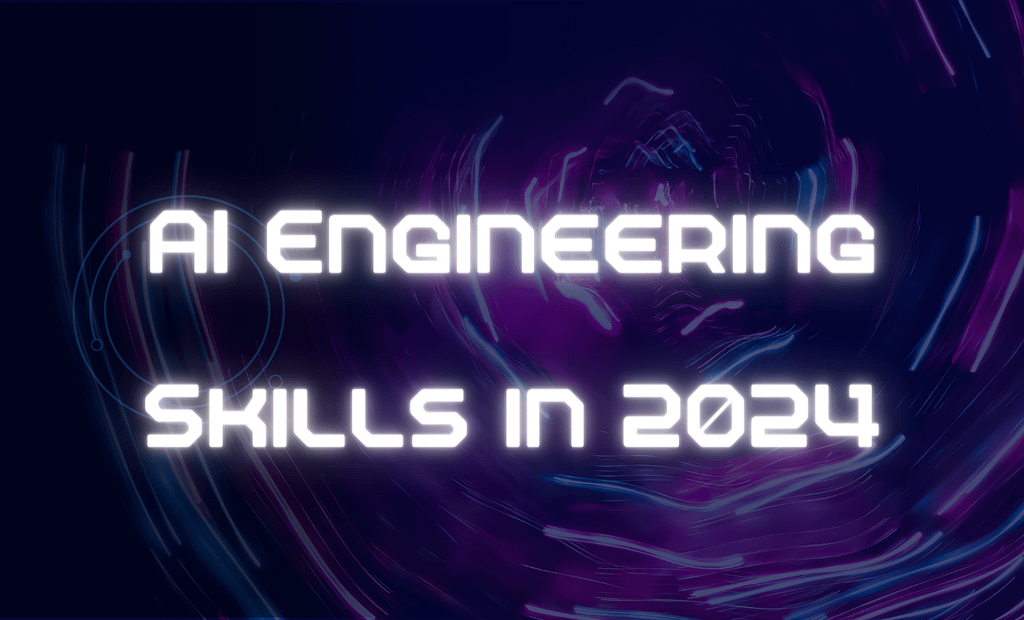AI Engineering Skills in 2024: What You Need to Succeed

The field of Artificial Intelligence (AI) is rapidly evolving, and as we step into 2024, the demand for skilled AI engineers is at an all-time high. AI engineering is a multidisciplinary field that blends software engineering, data science, and domain-specific knowledge to create intelligent systems. To thrive in this dynamic landscape, AI engineers need to possess a diverse set of skills. Here’s a look at the essential AI engineering skills you need in 2024.
1. Proficiency in Programming Languages
Overview: Mastery of programming languages is fundamental for any AI engineer. Python remains the dominant language due to its simplicity and extensive libraries for AI and machine learning (ML). However, knowledge of other languages like R, Java, C++, and Julia can also be advantageous.
Key Points:
- Python: Libraries like TensorFlow, PyTorch, scikit-learn, and Keras.
- R: Excellent for statistical analysis and data visualization.
- Java/C++: Useful for performance-intensive applications.
2. Understanding of Machine Learning Algorithms
Overview: A deep understanding of various ML algorithms is crucial. This includes both supervised and unsupervised learning techniques, such as regression, classification, clustering, and dimensionality reduction.
Key Points:
- Supervised Learning: Linear regression, logistic regression, decision trees, random forests, and support vector machines.
- Unsupervised Learning: K-means clustering, hierarchical clustering, and principal component analysis (PCA).
3. Deep Learning and Neural Networks
Overview: Deep learning, a subset of ML, focuses on neural networks with many layers. Knowledge of architectures like Convolutional Neural Networks (CNNs), Recurrent Neural Networks (RNNs), and Generative Adversarial Networks (GANs) is essential.
Key Points:
- Frameworks: TensorFlow, PyTorch, and Keras.
- Applications: Image and speech recognition, natural language processing (NLP), and autonomous systems.
4. Data Manipulation and Analysis
Overview: AI engineers must be adept at handling and analyzing large datasets. Skills in data manipulation, cleaning, and preprocessing are critical for building robust AI models.
Key Points:
- Tools: Pandas, NumPy, and SQL for data manipulation.
- Techniques: Data normalization, outlier detection, and feature engineering.
5. Natural Language Processing (NLP)
Overview: NLP is a rapidly growing area within AI, focusing on the interaction between computers and human languages. Understanding NLP techniques is crucial for tasks like text analysis, translation, and sentiment analysis.
Key Points:
- Libraries: NLTK, SpaCy, and Hugging Face Transformers.
- Applications: Chatbots, language translation, and text summarization.
6. Computer Vision
Overview: Computer vision enables machines to interpret and make decisions based on visual data. This skill is essential for developing applications in areas such as facial recognition, object detection, and autonomous vehicles.
Key Points:
- Techniques: Image processing, feature extraction, and object detection.
- Frameworks: OpenCV, TensorFlow, and PyTorch.
7. Big Data Technologies
Overview: Handling massive datasets is a common challenge in AI engineering. Proficiency in big data technologies is necessary to manage, process, and analyze large volumes of data efficiently.
Key Points:
- Tools: Hadoop, Spark, and Apache Kafka.
- Storage Solutions: HDFS, NoSQL databases, and cloud storage platforms like AWS and Google Cloud.
8. Model Deployment and Scalability
Overview: Building AI models is only part of the job; deploying them into production and ensuring they can scale is equally important. Knowledge of deployment strategies and cloud platforms is essential.
Key Points:
- Platforms: AWS, Google Cloud, Microsoft Azure, and Docker.
- Concepts: Continuous Integration/Continuous Deployment (CI/CD), microservices, and containerization.
9. Ethics and Explainability in AI
Overview: As AI systems become more prevalent, the importance of ethical considerations and explainability in AI grows. Understanding how to develop fair, transparent, and accountable AI systems is crucial.
Key Points:
- Ethical AI: Avoiding bias, ensuring privacy, and maintaining transparency.
- Explainable AI: Techniques to make AI decisions understandable to humans.
10. Soft Skills
Overview: Beyond technical skills, AI engineers need strong problem-solving abilities, creativity, and communication skills. These soft skills are vital for collaborating with diverse teams and effectively conveying complex ideas.
Key Points:
- Problem-Solving: Critical thinking and innovative solutions.
- Communication: Explaining technical concepts to non-technical stakeholders.
- Collaboration: Working effectively in cross-functional teams.
Table of Contents
Conclusion
AI engineering in 2024 demands a comprehensive skill set that spans programming, machine learning, big data, and ethical considerations. By mastering these skills, you can position yourself as a valuable asset in the rapidly evolving field of AI. Stay curious, keep learning, and embrace the challenges and opportunities that come with advancing technology. The future of AI is bright, and with the right skills, you can help shape it.
1 thought on “AI Engineering Best Skills in 2024”